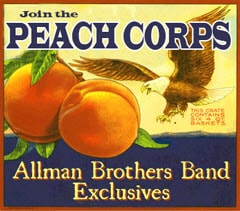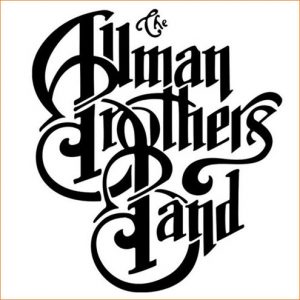BY KEVIN O’HARE
c.2006 Newhouse News Service
Gregg Allman was just a young man when he wrote “Midnight Rider,” a song that still stands as one of his signature tunes decades later, thanks in part to a phrase that’s helped define his career:
“The road goes on forever.”
For Allman, 58, lead singer, keyboardist and spiritual heart and soul of Southern rock icons the Allman Brothers Band, the road seemingly has gone on forever, and taken him places filled with joy and tragedy, despair and triumph.
Allman is on the road once again this summer, on a 26-date U.S. tour of larger venues with the Allman Brothers Band. In October, he’ll embark on a solo tour playing smaller theaters.
“I’ve had solo bands since `Laid Back’ was released in 1973, and I’ve played with some wonderful players and made some incredible music,” Allman said during a phone interview from his home south of Savannah, Ga. “But there’s just something about playing with the Allman Brothers. It’s like coming back to your roots. But it’s also still good to have both, it makes for kind of a balance.”
Allman was actually the last to join the original version of the Allman Brothers Band, founded by his guitarist brother Duane in Florida in early 1969. Duane had tapped bassist Berry Oakley and guitarist Dickey Betts. The band also had the unlikely combination of two drummers, Jaimoe (then known as Jai Johanny Johanson) and Butch Trucks. But there was a piece missing. And that was Duane’s younger brother, the blues-belting, blue-eyed soul wonder Gregg, who was rescued from the Los Angeles music scene.
“I was the last one to get there,” Allman said. “My brother called me just as I was about to put the gun to my head. He said, `I got this band together.”‘
Allman said he was a bit skeptical, in part because of the two drummers.
“Who would have known that two drummers would have worked?” he asked. “My brother told me that and I thought instant train wreck.”
Nevertheless, Allman flew to Jacksonville, Fla.. When he arrived, the band members blindfolded him and led him into the room where they’d been rehearsing.
“They took the blindfold off and there’s a brand new Hammond (organ) sitting there,” Allman recounted. “That and about four joints rolled on the bottom keyboard. They said, `We’ll see you in a few days.’ I’d only sat behind one twice in my life. I had played electric piano.”
Allman spent the next several weeks writing, and about seven weeks into his stint with the band, lightning struck while he was working at his brother’s girlfriend’s house.
“I got on a real roll,” Allman recalled. “I wrote `Whipping Post’ one night. I wrote it on an ironing board cover because I couldn’t find a pen. I used a box of kitchen matches, those strike-anywhere jobs. I’d light one, then light another one, blow it out and use it for the pen. … I’d really like to be able to find that ironing board cover now.
“The next morning I showed the song to the guys and we went down to the place where we rehearsed. By sundown we had that tune just like you hear it today. It was definitely magic.”
Despite the magic, the balance in Allman’s life has been shattered at times, most notably when Duane was killed in a motorcycle accident Oct. 29, 1971, in Macon, Ga.. The band was riding a wave of popularity at the time, much of it thanks to its classic 1971 live album “At Fillmore East.” Just over a year later, bassist Oakley died in an eerily similar motorcycle accident, not far from where Duane had crashed.
“The only way we could deal with it (Duane’s death) was to get back into the music,” Allman said. “It was either that or we’d have all been worthless. … Junkies playing in little tiny bands, beer joints the rest of our lives. That would have been the end of the Allman Brothers.”
The group had finished three sides of what eventually became the double-LP “Eat a Peach.”
“I said, `We’ve got to get a fourth side. We’ve got to get down there and do it now.”‘
Allman added “Melissa,” a song he’d written in 1967, and wrote “Ain’t Wastin’ Time No More,” for his brother. Betts chipped in with the instrumental “Les Brers in A Minor.”
“The object of the day there for a while was to do something that would make you stop crying,” Allman said. “Because it was just devastating. … It was terrible, but we got in that studio and let me tell you, my brother was there too. We found some peace of mind and some hope. And with that we finished `Eat a Peach,’ and it shipped platinum.”
The band has carried on through numerous personnel changes, breakups and reunions. The current lineup is still driven by Allman’s gutsy voice and organ work, the distinctive double drumming of Jaimoe and Trucks, and the twin guitar wonderwork that’s been the group’s calling card for decades.
Founding member Betts was summarily dismissed from the band in 2000, and without even being questioned about it, Allman makes his feelings clear.
“I don’t want to say anything about Mr. Betts, not pro, con or otherwise, thank you,” Allman offered with a snap in his voice.
The group’s current guitarists, veteran Warren Haynes and hotshot Derek Trucks (Butch Trucks’ nephew) carry on Duane’s tradition of fretboard brilliance.
The Allmans are as popular a concert draw as ever, and they frequently offer marathon performances — but not quite as long as in the old days.
“Our longest show? Probably at the closing of the Fillmore,” Allman said. “We started at about 11 and when we finished they opened the doors for the people to go out and the sunlight came in. It was probably a seven-hour set.”
The band mixes material from throughout its career on the current tour, and has also been covering a version of “The Weight” by the Band. The two groups have been tied in musical history since they shared a bill, together with the Grateful Dead, at the “Summer Jam at Watkins Glen” Festival in New York state in 1973. The show drew more than 600,000 fans.
“I was scared to death, man,” Allman said with a chuckle. “It was broad daylight and there was just a sea of people there. … They had three different monoliths of speakers, one every football field and a half. If you hadn’t, you could have played the last note, put your guitar in your case and shut it by the time the guy in the last row heard the last sound. It was a little scary, bro.”
When he’s not touring, writing or recording, Allman likes to work with cars, especially his new Corvette. Perhaps surprising, given the tragic history of his band, he also rides motorcycles and has two Harleys. But he insists that he keeps his speed within safe limits.
“I don’t really drive fast,” Allman said, “but just cruising along at 55 or 60, especially along these old two-lane roads down here in Georgia. There’s nothing more fun.”
Allman was laughing with his wife and playing with his two dogs during the interview before heading out to a boxing match that night.
“Just a regular guy,” he said.
A regular guy who’s a member of the Rock and Roll Hall of Fame and a pivotal figure in the history of music.
But can the road really go on forever?
“I’m gonna go as long as I can,” Allman said, noting that he’s generally in good shape. “It’s the audience that makes it all worthwhile, it really does. Traveling, that’s the work end of it. But once you walk on the stage man, that’s just total bliss, total paradise. I love it. I’m gonna do it as long as the good God lets me do it.”



